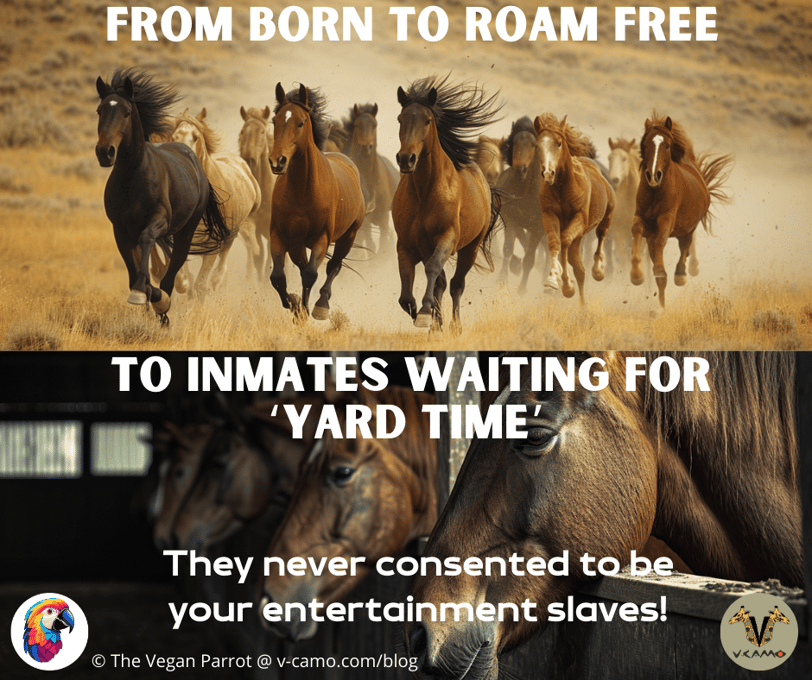The Harsh Reality Behind Horse Domestication: Understanding the Vegan Perspective
A short exploration of the vegan viewpoint on horse domestication.
Doug Fruitarky
1/27/20243 min read


The Harsh Reality Behind Horse Domestication: Understanding the Vegan Perspective
Introduction
The image of a free-roaming herd of horses contrasted with those confined in a barn, as depicted in a thought-provoking meme, serves as a powerful visual metaphor for the stark differences between the natural life of horses and the conditions they endure under human domestication. This post aims to delve into the vegan viewpoint on horse domestication, challenging the romanticized perceptions often associated with equestrian activities. We will explore the innate nature of horses as herd animals and the implications of their domestication, drawing on scientific evidence to understand the ethical considerations from a vegan standpoint.
Horses: Born to Be Wild
Horses, by their very nature, are herd animals. In the wild, they roam vast distances, a behavior crucial for their physical and psychological well-being. This nomadic lifestyle is not just a preference but a fundamental aspect of their existence. Studies have shown that free-roaming horses exhibit complex social structures and behaviors that are essential for their development and happiness. Horses in the wild cover distances of up to 20 miles a day, engaging in constant foraging and social interaction, which are critical for their mental health.
The Unnatural Life of Domesticated Horses
In stark contrast to their natural lifestyle, domesticated horses often face conditions that are antithetical to their inherent needs. The confinement in stables, limited social interaction, and unnatural workloads are just a few examples of how we alter their lives significantly.
Confinement and Isolation
The practice of keeping horses in stalls is particularly detrimental. It restricts their movement and prevents them from engaging in natural social behaviors. This confinement can lead to a range of health issues, including respiratory problems due to poor air quality and psychological stress. Research notes that horses confined to stalls for extended periods exhibit signs of stress and abnormal behaviors, such as cribbing and weaving, indicative of psychological distress.
The Burden of Labor
The use of horses for labor, whether it be pulling carriages, racing, or even recreational riding, imposes unnatural strains on their bodies. The burden of carrying weight on their backs, performing repetitive tasks, or running in circular tracks is not in line with their evolutionary design. A study from The Canadian Veterinary Journal reveals that repetitive strain from activities like racing can lead to long-term musculoskeletal problems in horses, highlighting the physical toll of these practices.
Challenging Romanticized Views of Horse Care
Many horse enthusiasts, particularly young girls and women, hold a romanticized view of horse ownership and care. They believe that their affection and care for these animals negate the inherent issues of domestication. However, this perspective overlooks the fundamental problem of denying horses their natural way of life.
Analogous to Prisoners: While well-cared-for horses may show signs of affection and seem content, this is akin to a prisoner finding joy in small freedoms while still being confined. The limited freedoms do not compensate for the loss of their natural lifestyle.
The Vegan Ethical Stance
From a vegan perspective, the domestication and use of horses for human purposes is seen as a form of exploitation. Vegans advocate for the rights of all sentient beings to live free from human-imposed suffering. This viewpoint challenges the notion of animals as property or commodities and emphasizes their right to live in accordance with their natural behaviors.
Ethical Consideration: Vegans argue that true respect for horses involves allowing them to live as nature intended, free from human-imposed constraints and duties.
Conclusion
Understanding the vegan perspective on horse domestication requires a shift in how we perceive our relationship with these majestic creatures. It's about recognizing their inherent needs and respecting their right to a life free from human-imposed limitations. While the bond between humans and horses can be strong, it's important to consider whether this relationship is truly beneficial for the horse, or if it merely serves human interests. The vegan ethos challenges us to rethink our interactions with all sentient beings, advocating for a world where respect for life in all its forms is paramount.
---
In this post, we have explored the vegan viewpoint on horse domestication, highlighting the significant differences between the natural lives of horses and the conditions imposed upon them by humans. By considering scientific evidence and ethical perspectives, we can better understand the implications of our actions and the need to reevaluate our relationship with these noble animals.





